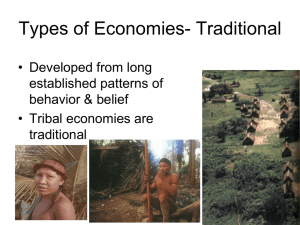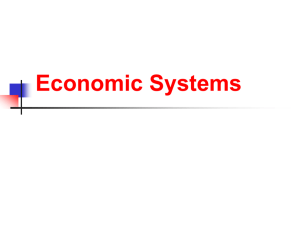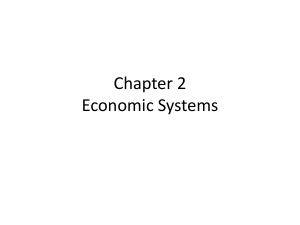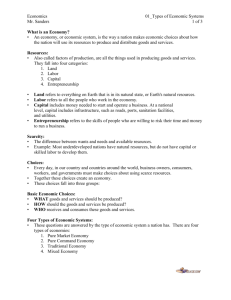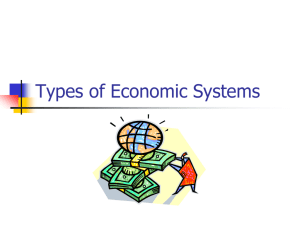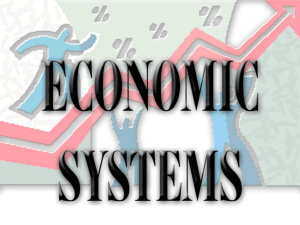econ 102.1 types of economic systems
advertisement
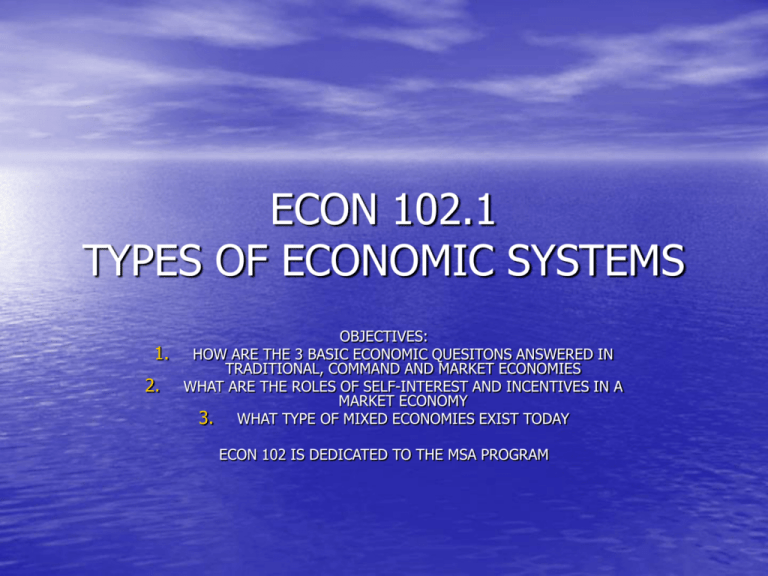
ECON 102.1 TYPES OF ECONOMIC SYSTEMS OBJECTIVES: 1. HOW ARE THE 3 BASIC ECONOMIC QUESITONS ANSWERED IN TRADITIONAL, COMMAND AND MARKET ECONOMIES 2. WHAT ARE THE ROLES OF SELF-INTEREST AND INCENTIVES IN A MARKET ECONOMY 3. WHAT TYPE OF MIXED ECONOMIES EXIST TODAY ECON 102 IS DEDICATED TO THE MSA PROGRAM ECON 102 DICTIONARY • TRADITIONAL • • • • • • ECONOMY COMMAND ECONOMY MARKET ECONOMY MARKET ECONOMY MARKET INCENTIVE SELF-INTEREST • MIXED ECONOMY • AUTHORITARIAN • • • SOCIALISM COMMUNISM CAPITALISM DEMOCRATIC SOCIALISM 3 BASIC ECONOMIC QUESTIONS • 1) What to produce • 2) How to produce • 3) For whom to produce RESPONSE TO THE 3 • HOW TO ANSWER THE 3 ECONOMIC QUESTIONS IS DETERMINED BY A NATION’S ECONOMIC SYSTEM. • There are 4 types of economic systems – – – – Traditional Command Market Mixed But in reality all economies are mixed, there are no pure economies today. TRADITIONAL ECONOMY • To answer the 3 basic economic questions, these societies look to the past. • Contemporary economic activities are based on the collection of rituals, habits, laws, and religious beliefs developed by the group’s ancestors. COMMAND ECONOMY • To answer the 3 basic economic questions, these societies look towards government officials (central planners) for answers. • They have the power to decide what products will be made and how these products are produced. • Individual have little to no say in this economy. • Pure command does no longer exists, but in the past they had, Middle Ages, Zhou Dynasty, ancient Egypt MARKET ECONOMY • To answer the 3 basic questions, this economy looks to the individual for answers. • People can buy, sell, and produce anything they want. • The free exchange of goods and services is referred to as the market. Market as a regulator • Adam Smith first person to explain market regulation • He contended that when the government is not involved in the economy, the market is driven by self-interest---the impulse that encourages people to fulfill their needs and wants. • The choices we make benefit society as well as us. • Incentives help motivate people to work harder. MIXED ECONOMIES • THIS ONE IS OBVIOUS THREE MAIN CATEGORIES 1) Authoritarian Socialism 2) Capitalism 3) Democratic Socialism Authoritarian Socialism • Also called Communism • Closest to pure command model • Government controls nearly all factors of production. Capitalism • U.S.A. • Closet to the market model • Individuals answer all the economic questions • Governments may enact regulations, but in a limited fashion • Examples??????????????? Democratic Socialism • Government owns some of the factors of production • Usually limited to key industries of national concern • Individuals are able to influence the economic planning through the election of government officials
